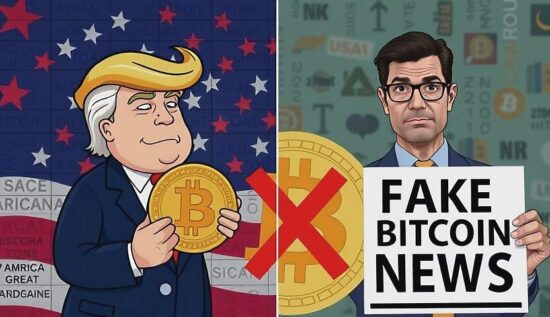Donald Trump’s sudden change of heart on cryptocurrencies has raised questions about his true intentions. In 2019, he tweeted, “I am not a fan of Bitcoin and other cryptocurrencies.” He warned of their potential for illegal use and emphasized the importance of the US dollar as the only true currency. However, during his 2024 re-election campaign, Trump recognized the potential of cryptocurrencies as a campaign theme. His team accepted donations in Bitcoin, Ethereum and other digital assets – a novelty in US politics.
At the Bitcoin conference in Nashville in July 2024, Trump declared, “Bitcoin is going to the moon. I want America to lead this movement – and that’s going to happen.” The markets responded promptly, with Bitcoin surpassing the $100,000 mark and the crypto community hailed Trump as their new champion. But can he deliver on his promises?
Trump’s sudden turnaround from a crypto skeptic to a supporter has sparked debate. Is it a genuine paradigm shift or a strategic move to win over tech-savvy voters and investors? The crypto industry has gained significant influence in recent years, particularly among young voters who see digital currencies as the future of finance.
Experts are divided on the implications of Trump’s new stance. Some see it as an opportunity to establish regulatory clarity and position the US as a leader in the crypto space. Others view his promises as empty words – a short-term ploy to mobilize support from the crypto community without making substantial policy changes.
Immediately after taking office, Trump set new priorities. One of his first presidential orders was the establishment of a task force to regulate cryptocurrencies, led by David Sacks, his new “AI & Crypto Czar.” The SEC, which had been aggressive in its enforcement of crypto companies under the Biden administration, was restructured and regulations were relaxed. Controversial accounting guidelines that forced companies to devalue their cryptocurrencies were also repealed.
Trump’s explicit rejection of a digital central bank currency (CBDC) was particularly significant. By executive order, he halted the development of a digital US dollar – a decision that may have given China and the EU a strategic advantage, as both are actively working on their own CBDCs.
Simultaneously, his team brought up the idea of a national Bitcoin reserve, a concept with potentially far-reaching economic and geopolitical implications.
A Bitcoin reserve for the US – revolution or risk?
According to insiders, Trump plans to massively acquire Bitcoin. Senator Cynthia Lummis has already introduced a bill that would allow the US to buy up to a million Bitcoins – about five percent of the total supply. Such a move could elevate Bitcoin from a decentralized cryptocurrency to a strategic state reserve, with profound implications for the financial markets.
Travis Kling, founder of the crypto asset manager Ikigai, predicts a “bidding war” over Bitcoin, with price predictions ranging from $150,000 to $500,000.
However, a state-backed Bitcoin reserve also poses significant risks: if the US were to later sell large amounts of its holdings, it could trigger extreme market fluctuations. Moreover, the question remains as to whether other nations would follow suit. Hong Kong, for example, is considering adding Bitcoin to its currency reserves.
Global implications and uncertain future
In the short term, Bitcoin remains vulnerable to price fluctuations. Recently, the US government sold 69,370 seized Bitcoins, which temporarily put pressure on the market. Even rising interest rates and a strong US dollar could dampen the Bitcoin price. However, in the long term, Trump’s policy could establish Bitcoin not only in the US but globally.
Jerome Powell, the head of the US Federal Reserve, has already referred to Bitcoin as “like digital gold.” While Bitcoin may resemble digital gold, it primarily serves speculative purposes and not as a established medium of exchange or stable store of value.
If the US government were to establish a strategic Bitcoin reserve, it would not only have economic implications but also geopolitical ones. Europe and China may need to develop their own crypto strategies to avoid falling behind.
Whether Trump’s crypto policy will truly bring about a lasting change or is just an election ploy remains to be seen. However, 2025 could be a decisive year for the future of Bitcoin and the global financial order.
Trump is known for his rhetorical exaggerations and his recent statements about hypothetical scenarios he likes to project into the future are no exception. He claims that Russia would never have attacked Ukraine if he had remained president in 2021. He also claims that the US budget deficit and national debt would be significantly lower if he had remained in office. These claims are, however, difficult to substantiate and appear like wishful thinking that cannot be supported by facts.
Especially adventurous is Trump’s suggestion that the US’s $35 trillion debt could be paid off with “a few Bitcoins.” The question remains as to how he would acquire these Bitcoins – through the sale of existing government holdings or through the purchase of new ones? And who exactly are the anonymous “creditors” playing a role in his statements? These ideas appear unrealistic and raise more questions than they answer.
In the crypto community, the correlation between the creation of USDT (Tether) and the Bitcoin price has been a topic of discussion for a while. The possibility that private companies create unbacked USDT units to buy Bitcoin and manipulate the market is a recurring theme. Trump has previously expressed himself critically about the digital central bank currency (CBDC), but in light of the developments in Russia and China, this stance could change. The US could establish a “Strategic Bitcoin Reserve” (SBR) to support the dollar, with Bitcoin serving as an insurance against inflation.
The geopolitical dimension is becoming increasingly relevant. Russia and China are integrating cryptocurrencies as part of their financial strategy and the US may be forced to follow suit. The creation of an SBR under Trump would be a potential response to the economic challenges the country is facing. However, the question remains as to whether Bitcoin would serve as a solution or an instrument of control, especially in the context of an increasingly digital global economy.
Trump’s ideas are, as usual, speculative, but the possibility that Bitcoin plays a significant role in the global financial system is not far-fetched. Whether as a shield against inflation or as a geopolitical instrument – the future of the cryptocurrency will remain closely tied to the political landscape.





